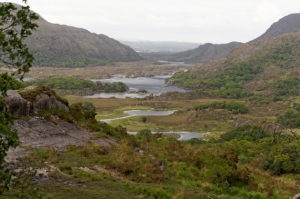A Just Transition is Possible for Ireland’s South West
The Shannon LNG terminal is still promoted as a key employer for the South-West of Ireland. But the transition to clean, renewable energy offers a better path for workers and the climate.
The Shannon LNG terminal is still promoted as a key employer for the South-West of Ireland. But the transition to clean, renewable energy offers a better path for workers and the climate.

The rural area of Ballylongford in County Kerry, Ireland, has become the centre of attention in a debate that pits advocates of the gas industry against those pushing for a renewable energy future.
Ballylongford is the proposed location for Shannon LNG, an import terminal which seeks to import liquefied fossil gas, likely sourced from fracking operations in the United States.
Although the project was granted planning permission in 2008, due to legal challenges and a campaign co-initiated by Food & Water Europe two years ago, not a brick has been laid in this controversial project.
While local opposition to Shannon LNG has existed since the project’s inception, in the last three years a growing international coalition of civil society groups has been calling for the project to be scrapped. This opposition stems from the devastating effect which fracking, LNG and associated methane leakages have on the planet’s temperature. “Stop Shannon LNG” has become one of the key demands of major grassroots movements such as Fridays for Future Ireland, and is supported by all major political parties with the exception of the governing Fine Gael party.
Despite this growing opposition to Shannon LNG, some local business groups, politicians and media platforms still support the project. Backers say the LNG terminal will provide jobs to an area struggling with unemployment and outward migration. However, these concerns are countered in a new fact sheet from Food and Water Europe (insert link), which details the many job opportunities that the transition to a zero-carbon society can provide, and how the counties of Kerry, Clare and Limerick are well-placed to benefit from this transition.
The Shannon LNG terminal would, at most, provide 100 long-term and 650 short-term jobs, both directly and indirectly; but recent reductions to the planned size of the terminal mean that this figure is now inflated. All of these hypothetical jobs would be entirely dependent on the boom and bust fossil fuel industry.
Ireland, like the rest of the world, needs to rapidly transition away from fossil fuels in order to meet its climate targets. As Ireland moves towards renewable energy, jobs in the fossil fuel industry will have to shift; the decommissioning of Moneypoint coal plant already represents significant job losses for Ireland’s South-West. Creating new jobs in the gas sector which will also be phased out sets the region up to suffer this blow a second time.
Thankfully, there is a huge potential for employment related to the energy transition. Situated on the Atlantic Ocean, the South-West of Ireland is famed for its rolling waves, beautiful landscapes and windy weather. The area has the geography, weather conditions and manufacturing expertise to become a hub for wind and wave energy. Eco-tourism and outdoor recreation activities can further boost the tourism industry on which one in five jobs in County Kerry depend. Energy efficiency undertakings, such as retrofitting houses and the development of a sustainable public transport system, can also provide thousands of jobs.
Local people have the skills to fill these jobs. There are many highly-qualified, but underemployed people in the South-West who have the scientific, technical, business and administrative skills crucial for the transition to a zero-carbon society. Those currently working in the fossil fuel industry are similarly well-qualified, and will be able to retrain for jobs in the renewable energy and energy efficiency sectors if they are provided with the right support by the government.
A fair and just transition to a renewable economy across Ireland is dependent on government policy. National-level decisions made in collaboration with workers and their representatives will ensure that the interests of workers are protected in this just transition. The future of employment in Ireland’s South-West rests on key political decisions: Will the government choose to support the climate-hostile Shannon LNG, or choose to invest the necessary funds and resources in a clean, renewable future?


